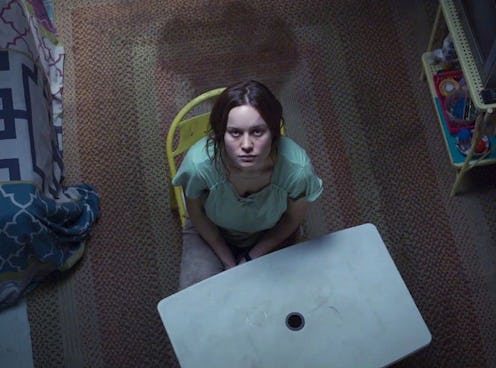Entertainment
This Is What Inspired 'Room'

If you haven't seen Brie Larson's Oscar-nominated performance in Room, put down your phone, back away from the computer, reconsider your priorities, and get to a theater. If you've already gone through the emotional turmoil of this film, you totally understand why Larson skyrocketed from indie darling to full-blown movie star overnight; the actor forcefully occupies a powerful script penned by Emma Donoghue, author of the book behind the movie. What inspired Room , however, is even more jarring than its on-screen depiction. Though her work is fiction, Donoghue found some of her inspiration in the horrifying story of Elisabeth Fritzl and has spoken frequently about how her role as a mother colored her view of this case.
Following the 2010 release of Room, Donoghue discussed the 24-year imprisonment of the Fritzl family — in which a father kept his teen daughter hostage for over 20 years and impregnated her several times before eventually being brought to trial and sentenced to life imprisonment — in an interview with The Guardian, saying,
To say Room is based on the Fritzl case is too strong. I'd say it was triggered by it. The newspaper reports of Felix Fritzl [Elisabeth's son], aged five, emerging into a world he didn't know about, put the idea into my head. That notion of the wide-eyed child emerging into the world like a Martian coming to Earth: it seized me.
The following year, The New Yorker published a conversation with the author in which Donoghue again recounted the beginnings of Room and the events surrounding the Fritzl family, saying, "Within a few days I knew I wanted to write the story of a boy who would have only that much in common with Felix Fritzl, that he’d be five and encountering our world for the first time." While she credited Cormac McCarthy's dystopian masterpiece, The Road, with also sparking her imagination, Donoghue also described how she drew from dialogues with her own young child. Said the author,
The conversations sometimes came verbatim from me-and-Finn-at-five (such as the one in which he asks Ma whether, if he’s born again from her body, she’ll call him by the same name) but the games and crafts came from a mixture of sources, including a few books (there’s a great hippy one called PRESCHOOL ART: IT’S THE PROCESS, NOT THE PRODUCT) and a few friends who mother in a way more hands-on, full-time way than I do.
In a personal essay for The Guardian, Donoghue further explained how her experiences as a new mother gave meaning to Room. She recalled encountering a news article on Elisabeth Fritzl for the first time and having two very different thoughts. Wrote Donoghue,
My first thought was: how did she do that, how did she manage to mother – and mother well – in a locked room? But my second thought was: aren't there moments for every parent, and every child too, when that intimate bond feels like a locked room?
This sense of honesty and heightened reality pulses through Room. If Donoghue's work left you hungry for more, there are plenty of books that explore entrapment, danger, and motherhood — just be warned, you might need a box of tissues.
Image: A24